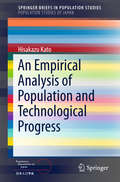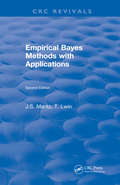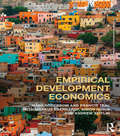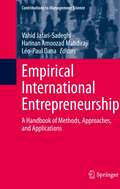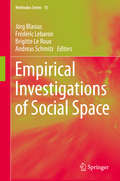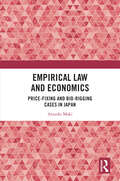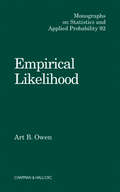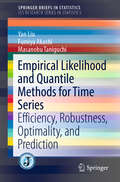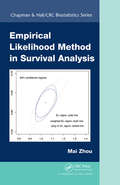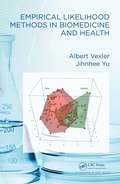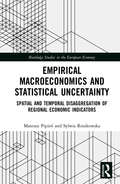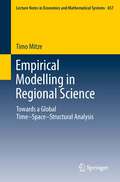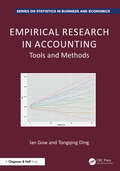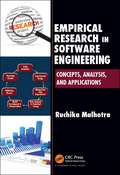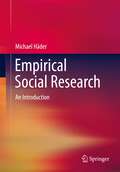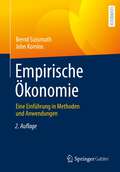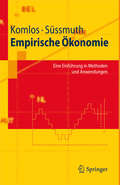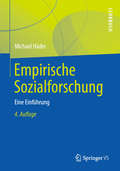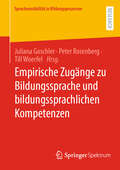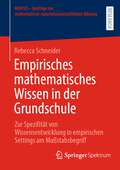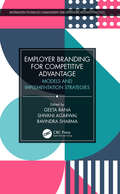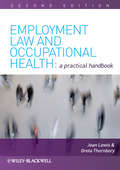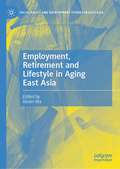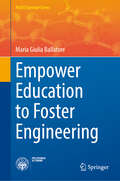- Table View
- List View
An Empirical Analysis of Population and Technological Progress (SpringerBriefs in Population Studies)
by Hisakazu KatoAnalyzing the relation between population factors and technological progress is the main purpose of this book. With its declining population, Japan faces the simple but difficult problem of whether sustained economic growth can be maintained. Although there are many studies to investigate future economic growth from the point of view of labor force transition and the decreasing saving rate, technological progress is the most important factor to be considered in the future path of the Japanese economy. Technological progress is the result of innovations or improvements in the quality of human and physical capital. The increase in technological progress, which is measured as total factor productivity (TFP), is realized both by improvements in productivity in the short term and by economic developments in the long term. The author investigates the relationship of population factors and productivity, focusing on productivity improvement in the short term. Many discussions have long been held about the relation between population and technological progress. From the old Malthusian model to the modern endogenous economic growth models, various theories are developed in the context of growth theory. In this book, these discussions are summarized briefly, with an analysis of the quantitative relation between population and technological progress using country-based panel data in recent periods.
Empirical Bayes Methods with Applications (Routledge Library Editions: Econometrics Ser. #12)
by J.S. MaritzThe second edition of Empirical Bayes Methods details are provided of the derivation and the performance of empirical Bayes rules for a variety of special models. Attention is given to the problem of assessing the goodness of an empirical Bayes estimator for a given set of prior data. A chapter is devoted to a discussion of alternatives to the empirical Bayes approach and there is also a chapter giving details of several actual applications of empirical Bayes method.
Empirical Development Economics (Routledge Advanced Texts in Economics and Finance)
by Måns Söderbom Francis Teal Markus Eberhardt Simon Quinn Andrew ZeitlinUnderstanding why so many people across the world are so poor is one of the central intellectual challenges of our time. This book provides the tools and data that will enable students, researchers and professionals to address that issue. Empirical Development Economics has been designed as a hands-on teaching tool to investigate the causes of poverty. The book begins by introducing the quantitative approach to development economics. Each section uses data to illustrate key policy issues. Part One focuses on the basics of understanding the role of education, technology and institutions in determining why incomes differ so much across individuals and countries. In Part Two, the focus is on techniques to address a number of topics in development, including how firms invest, how households decide how much to spend on their children’s education, whether microcredit helps the poor, whether food aid works, who gets private schooling and whether property rights enhance investment. A distinctive feature of the book is its presentation of a range of approaches to studying development questions. Development economics has undergone a major change in focus over the last decade with the rise of experimental methods to address development issues; this book shows how these methods relate to more traditional ones. Please visit the book's website at www.empiricalde.com for online supplements including Stata files and solutions to the exercises.
Empirical Evidence on the Efficiency of Forward and Futures Foreign Exchange Markets (Fundamentals Of Pure And Applied Economics Ser.)
by Robert J. HodrickThis book presents a critical review of the empirical literature that studies the efficiency of the forward and futures markets for foreign exchange. It provides a useful foundation for research in developing quantitative measures of risk and expected return in international finance.
Empirical International Entrepreneurship: A Handbook of Methods, Approaches, and Applications (Contributions to Management Science)
by Vahid Jafari-Sadeghi Hannan Amoozad Mahdiraji Léo-Paul DanaThis handbook is focused on the analytical dimension in researching international entrepreneurship. It offers a diverse collection of chapters focused on qualitative and quantitative methods that are being practised and can be used by future researchers in the field of international entrepreneurship. The qualitative cluster covers articles, conceptual and empirical chapters as well as literature reviews, whereas the quantitative cluster analyses international entrepreneurship through a broad range of statistical methods such as regressions, panel data, structural equation modelling as well as decision-making and optimisation models in certain and uncertain circumstances. This book is essential reading for researchers, scholars and practitioners who want to learn and implement new methods in analysing entrepreneurial opportunities across national borders.
Empirical Investigations of Social Space (Methodos Series #15)
by Jörg Blasius Andreas Schmitz Frédéric Lebaron Brigitte Le RouxThis book provides an in-depth view on Bourdieu’s empirical work, thereby specially focusing on the construction of the social space and including the concept of the habitus. Themes described in the book include amongst others: • the theory and methodology for the construction of “social spaces”, • the relation between various “fields” and “the field of power”, • formal construction and empirical observation of habitus, • the formation, accumulation, differentiation of and conversion between different forms of capital, • relations in geometric data analysis.The book also includes contributions regarding particular applications of Bourdieu’s methodology to traditional and new areas of research, such as the analysis of institutional, international and transnational fields. It further provides a systematic introduction into the empirical construction of the social space.
Empirical Law and Economics: Price-Fixing and Bid-Rigging Cases in Japan
by Atsushi MakiMaki provides an empirical analysis of law and economics by reevaluating Myrdal's value premises and Weber's separation of analysis and policy.In modern civil society, individuals and businesses conduct economic activities through markets. The mainstream economic theory is the general equilibrium theory, which assumes a perfectly competitive market. The upshot is that transactions through competitive markets maximize the economic welfare of society, with policies such as deregulation and privatization being implemented with the backing of the law. However, in the real economy, legal transactions do not always take place, and this book analyzes price-fixing and bid-rigging cases. These cases show that there is a gap between competition philosophy and legislation. Using the real economy as data, this book conducts an empirical analysis of law and economics and illustrates issues related to the ideals of economics and the proper application of law. Accumulating empirical results will provide the means to form a healthy civil society.A useful reference for graduate students and researchers in economics and legal research, and an interesting read for those who consider economics to be an empirical science.
Empirical Likelihood (Chapman & Hall/CRC Monographs on Statistics and Applied Probability)
by Art B. OwenEmpirical likelihood provides inferences whose validity does not depend on specifying a parametric model for the data. Because it uses a likelihood, the method has certain inherent advantages over resampling methods: it uses the data to determine the shape of the confidence regions, and it makes it easy to combined data from multiple sources. It al
Empirical Likelihood and Quantile Methods for Time Series: Efficiency, Robustness, Optimality, and Prediction (SpringerBriefs in Statistics)
by Yan Liu Fumiya Akashi Masanobu TaniguchiThis book integrates the fundamentals of asymptotic theory of statistical inference for time series under nonstandard settings, e.g., infinite variance processes, not only from the point of view of efficiency but also from that of robustness and optimality by minimizing prediction error. This is the first book to consider the generalized empirical likelihood applied to time series models in frequency domain and also the estimation motivated by minimizing quantile prediction error without assumption of true model. It provides the reader with a new horizon for understanding the prediction problem that occurs in time series modeling and a contemporary approach of hypothesis testing by the generalized empirical likelihood method. Nonparametric aspects of the methods proposed in this book also satisfactorily address economic and financial problems without imposing redundantly strong restrictions on the model, which has been true until now. Dealing with infinite variance processes makes analysis of economic and financial data more accurate under the existing results from the demonstrative research. The scope of applications, however, is expected to apply to much broader academic fields. The methods are also sufficiently flexible in that they represent an advanced and unified development of prediction form including multiple-point extrapolation, interpolation, and other incomplete past forecastings. Consequently, they lead readers to a good combination of efficient and robust estimate and test, and discriminate pivotal quantities contained in realistic time series models.
Empirical Likelihood Method in Survival Analysis
by Mai ZhouEmpirical Likelihood Method in Survival Analysis explains how to use the empirical likelihood method for right censored survival data. The author uses R for calculating empirical likelihood and includes many worked out examples with the associated R code. The datasets and code are available for download on his website and CRAN.The book focuses on all the standard survival analysis topics treated with empirical likelihood, including hazard functions, cumulative distribution functions, analysis of the Cox model, and computation of empirical likelihood for censored data. It also covers semi-parametric accelerated failure time models, the optimality of confidence regions derived from empirical likelihood or plug-in empirical likelihood ratio tests, and several empirical likelihood confidence band results.While survival analysis is a classic area of statistical study, the empirical likelihood methodology has only recently been developed. Until now, just one book was available on empirical likelihood and most statistical software did not include empirical likelihood procedures. Addressing this shortfall, this book provides the functions to calculate the empirical likelihood ratio in survival analysis as well as functions related to the empirical likelihood analysis of the Cox regression model and other hazard regression models.
Empirical Likelihood Methods in Biomedicine and Health
by Albert Vexler Jihnhee YuEmpirical Likelihood Methods in Biomedicine and Health provides a compendium of nonparametric likelihood statistical techniques in the perspective of health research applications. It includes detailed descriptions of the theoretical underpinnings of recently developed empirical likelihood-based methods. The emphasis throughout is on the application of the methods to the health sciences, with worked examples using real data. Provides a systematic overview of novel empirical likelihood techniques. Presents a good balance of theory, methods, and applications. Features detailed worked examples to illustrate the application of the methods. Includes R code for implementation. The book material is attractive and easily understandable to scientists who are new to the research area and may attract statisticians interested in learning more about advanced nonparametric topics including various modern empirical likelihood methods. The book can be used by graduate students majoring in biostatistics, or in a related field, particularly for those who are interested in nonparametric methods with direct applications in Biomedicine.
Empirical Macroeconomics and Statistical Uncertainty: Spatial and Temporal Disaggregation of Regional Economic Indicators (Routledge Studies in the European Economy)
by Mateusz Pipień Sylwia RoszkowskaThis book addresses one of the most important research activities in empirical macroeconomics. It provides a course of advanced but intuitive methods and tools enabling the spatial and temporal disaggregation of basic macroeconomic variables and the assessment of the statistical uncertainty of the outcomes of disaggregation. The empirical analysis focuses mainly on GDP and its growth in the context of Poland. However, all of the methods discussed can be easily applied to other countries. The approach used in the book views spatial and temporal disaggregation as a special case of the estimation of missing observations (a topic on missing data analysis). The book presents an econometric course of models of Seemingly Unrelated Regression Equations (SURE). The main advantage of using the SURE specification is to tackle the presented research problem so that it allows for the heterogeneity of the parameters describing relations between macroeconomic indicators. The book contains model specification, as well as descriptions of stochastic assumptions and resulting procedures of estimation and testing. The method also addresses uncertainty in the estimates produced. All of the necessary tests and assumptions are presented in detail. The results are designed to serve as a source of invaluable information making regional analyses more convenient and – more importantly – comparable. It will create a solid basis for making conclusions and recommendations concerning regional economic policy in Poland, particularly regarding the assessment of the economic situation. This is essential reading for academics, researchers, and economists with regional analysis as their field of expertise, as well as central bankers and policymakers.
Empirical Modelling in Regional Science
by Timo MitzeEconomic agents interact in structural relationships through time and space. This work starts from the empirical observation that all three dimensions, namely time, space, and structural functional forms, are important for an integrative framework of modern empirical analysis in regional science. The work thus aims at combining up-to-date econometric tools from the fields of spatial econometrics, panel time-series analysis and structural simultaneous equation modelling to analysis the different research questions at hand. Most of the topics dealt within this work start from a concrete empirical problem, while problem solving also aims at generating some new knowledge in a methodological way, e.g. by the complementary use of Monte Carlo simulation studies to compare the empirical performance of different estimators for specific data samples. Following a first introductory chapter, the work is structured in three parts addressing major issues in building up a stylized regional economic model such as interregional migration, factor and final demand estimation. All empirical applications use German regional data.
Empirical Research in Accounting: Tools and Methods (Chapman and Hall/CRC Series on Statistics in Business and Economics)
by Ian D. Gow Tongqing DingThis textbook provides the foundation for a course that takes PhD students in empirical accounting research from the very basics of statistics, data analysis, and causal inference up to the point at which they conduct their own research. Starting with foundations in statistics, econometrics, causal inference, and institutional knowledge of accounting and finance, the book moves on to an in-depth coverage of the core papers in capital market research. The latter half of the book examines contemporary approaches to research design and empirical analysis, including natural experiments, instrumental variables, fixed effects, difference-in-differences, regression discontinuity design, propensity-score matching, and machine learning. Readers of the book will develop deep data analysis skills using modern tools. Extensive replication and simulation analysis is included throughout.Key Features: Extensive coverage of empirical accounting research over more than 50 years. Integrated coverage of statistics and econometrics, institutional knowledge, and research design. Numerous replications and a dozen simulation analyses to immerse readers in papers and empirical analysis. All tables and figures in the book can be reproduced by readers using included code. Easy-to-use templates facilitate hands-on exercises and introduce reproduceable research concepts. (Solutions available to instructors.)
Empirical Research in Software Engineering: Concepts, Analysis, and Applications
by Ruchika MalhotraEmpirical research has now become an essential component of software engineering yet software practitioners and researchers often lack an understanding of how the empirical procedures and practices are applied in the field. Empirical Research in Software Engineering: Concepts, Analysis, and Applications shows how to implement empirical research pro
Empirical Social Research: An Introduction
by Michael HäderSocial science methods such as surveys, observations and content analyses are used in market research, studies of contemporary history, urban planning and communication research. They are all the more needed by sociologists and empirically working political scientists. Whether in the context of evaluating a prevention programme or for surveying health behaviour or for a study on social mobility, the confident handling of the social science instruments is always a prerequisite for obtaining reliable results. This book provides important information for users and developers of these instruments. It deals with the theoretical foundations of the methods, the steps in the conception and implementation of a project, the many variants of data collection, the methods to be used in the selection of study units, as well as the principles to be observed in the evaluation and documentation of the findings. With the help of numerous examples, a particularly clear presentation is achieved. In the fourth, updated edition, river sampling has now been included in the selection process, digital methods are increasingly presented and, against the background of the new data protection regulation, research ethics and data protection are also updated.
Empirische Ökonomie: Eine Einführung in Methoden und Anwendungen (Springer-lehrbuch Ser.)
by Bernd Süssmuth John KomlosDas Buch liefert eine anwendungsorientierte Einführung in ökonometrische Methoden. Anhand einfacher, aber origineller Anwendungen aus verschiedenen Gebieten wie Wirtschaftsgeschichte, Humankapitaltheorie oder Biologie werden die Methoden der klassischen Ökonometrie erklärt und veranschaulicht. Auf diese Art und Weise werden nicht nur methodische Fertigkeiten vermittelt, sondern Studierende zum eigenständigen empirischen Arbeiten motiviert. Fachkenntnisse werden nicht vorausgesetzt. Die 2. Auflage wurde um ein zusätzliches Kapitel ergänzt.
Empirische Ökonomie
by Bernd Süssmuth John KomlosDas Buch führt anhand einfacher und zugleich origineller Anwendungen aus Gebieten wie Wirtschaftsgeschichte, Humankapitaltheorie oder Biologie in die Methoden der klassischen Ökonometrie ein. Da auch grundlegende Konzepte der beschreibenden und schließenden Statistik behandelt werden, sind keine Vorkenntnisse nötig. Damit stellt sich das Buch der Aufgabe, den Studierenden neben den methodischen Fertigkeiten auch Anregung und Motivation zu eigenständigem empirischen Arbeiten zu geben.
Empirische Sozialforschung: Eine Einführung
by Michael HäderSozialwissenschaftliche Methoden wie Befragungen, Beobachtungen und Inhaltsanalysen kommen in der Marktforschung, bei Studien zur Zeitgeschichte, in der Stadtplanung und in der Kommunikationsforschung zum Einsatz. Erst recht werden sie von Soziologen und empirisch arbeitenden Politikwissenschaftlern benötigt. Egal, ob im Rahmen der Evaluation eines Präventionsprogramms oder für die Erhebung des Gesundheitsverhaltens oder für eine Studie zur sozialen Mobilität, die sichere Handhabung des sozialwissenschaftlichen Instrumentariums ist stets die Voraussetzung, um belastbare Ergebnisse zu erzielen. Das Buch stellt wichtige Informationen für die Anwender und Entwickler dieser Instrumente zur Verfügung. Es behandelt die theoretischen Grundlagen der Methoden, die Schritte bei der Konzipierung und Umsetzung eines Projekts, die vielfältigen Varianten der Datenerhebung, die bei der Auswahl der Untersuchungseinheiten einzusetzenden Methoden ebenso wie die Prinzipien, die bei der Auswertung und Dokumentation der Befunde zu beachten sind. Mithilfe zahlreicher Beispiele gelingt eine besonders anschauliche Darstellung.In der vierten, aktualisierten Auflage hat im Rahmen der Auswahlverfahren nun auch das River Sampling Eingang gefunden, werden verstärkt auch digitale Methoden vorgestellt sowie vor dem Hintergrund der neuen Datenschutzverordnung auch die Forschungsethik und der Datenschutz aktualisiert.
Empirische Zugänge zu Bildungssprache und bildungssprachlichen Kompetenzen (Sprachsensibilität in Bildungsprozessen)
by Juliana Goschler Peter Rosenberg Till WoerfelIn der Diskussion über Sprache in Bildungskontexten geht man davon aus, dass diese sogenannte „Bildungssprache“ durch verschiedene grammatische und lexikalische Merkmale charakterisiert wird. Häufig wird außerdem angenommen, dass diese Merkmale für Schüler/-innen – unter anderem und insbesondere solchen, die Deutsch als Zweitsprache erlernen – schwierig und damit eine Hürde für erfolgreiches fachliches Lernen sein könnten. Der Band widmet sich in einer Reihe von Einzelstudien möglichen Zugängen zur empirischen Überprüfung dieser Annahmen.
Empirisches mathematisches Wissen in der Grundschule: Zur Spezifität von Wissensentwicklung in empirischen Settings am Maßstabsbegriff (MINTUS – Beiträge zur mathematisch-naturwissenschaftlichen Bildung)
by Rebecca SchneiderIm vorliegenden Buch werden Wissensentwicklungsprozesse von Schüler*innen der Grundschule bei der Bearbeitung empirischer Settings untersucht und dabei eine Beschreibung des für die Schüler*innen rekonstruierbaren mathematischen Wissens vorgenommen. Zur Untersuchung wird ein erkenntnistheoretisches Instrumentarium eingesetzt, welches das Konzept der Subjektiven Erfahrungsbereiche mit dem Konzept der empirischen Theorien verbindet und die Grundlage für die hier gewonnen Erkenntnisse darstellt. Am Beispiel des Maßstabsbegriff wird aufgezeigt, dass zahlreiche klassische Aufgabenstellungen eine Quantifizierung maßstabsgetreuer Längen fokussieren, die für Schülerinnen und Schüler der Grundschule jedoch problematisch ist. Darüber hinaus wird aufgezeigt, inwiefern eine durch die Lehrkraft eingenommene Erwartungshaltung an die Bearbeitungswege von Schülerinnen und Schülern Wissensentwicklungsprozesse beeinflussen kann und welche Bedeutung der physikalischen Repräsentation empirischer Objekte für die Wissensentwicklung von Schülerinnen und Schüler der Grundschule zukommt.
Employer Branding for Competitive Advantage: Models and Implementation Strategies (ISSN)
by Geeta Rana Shivani Agarwal Ravindra SharmaThis book shows how to build and maintain a distinctive and credible employer brand and develop a set of relevant success metrics to help measure return on investment (ROI). Starting with the current interest in employer branding, this book looks at the historical roots of brand management and the practical steps to achieve employer brand management success.The book will review the pressures that have generated current interest in employer branding. It goes on to look at the historical roots of brand management and the practical steps necessary to achieve employer brand management success. The book includes the business case, research, positioning, implementation, management and measurement, and case studies of big-named employer brand stories.This book will provide new insights into the field of employer branding and provide directions and tools for organizational brand building. It will be beneficial for research scholars, engineers, practitioners, and management students.
Employment Law and Occupational Health: A Practical Handbook
by Joan Lewis Greta Thornbory'Employment Law and Occupational Health: A Practical Handbook' provides an essential guide to best practice for all occupational health practitioners. This readable guide to the law will help to ensure both business success and respect for individual employment rights. The cost of sickness absence can present major costs and business management problems. Safeguarding health is therefore vital to both individuals and employers. 'Employment Law and Occupational Health' explores key issues in occupational health practice from pre-employment, through health surveillance and occupational health services, to termination of employment. Topics explored include ethical and confidentiality issues, discrimination, data protection, working abroad, pregnancy and maternity leave, workplace policies, drugs and alcohol testing, stress, counselling, health surveillance and professional conduct rules. This second edition has been fully revised and updated to include a number of significant changes to employment law as well as new case law decisions that have occurred since the 1st Edition was published. Essential new material has also been included around age discrimination, disability discrimination, work related stress, corporate manslaughter and work-place bullying. An accessible, practical guide to applying health law in everyday practice. For occupational health nurses and other occupational health practitioners. Addresses key employment issues from pre-employment to termination of employment. Includes case studies, procedural checklists, and template letters and forms.
Employment, Retirement and Lifestyle in Aging East Asia (Social Policy and Development Studies in East Asia)
by Xinxin MaThis project offers a comprehensive look at aging policies across East Asia, where a demographic dividend fuelled rapid growth and is now aging into a lower-speed economy. With a comprehensive look at numerous East Asian societies, including China, Japan, Korea, and other regions, the book is rich in comparative insights and strategies into what is effective for policymakers and employers. As the Asian century begins, this book will be an invaluable resource for economists, policymakers and demographers.
Empower Education to Foster Engineering (PoliTO Springer Series)
by Maria Giulia BallatoreThis book highlights the pivotal role that engineering education researchers can play at technical universities. By delving into both theoretical and practical aspects, it showcases the transformative potential of integrating rigorous educational research into technical education. The book begins by outlining the current landscape of engineering education research and situates it within the unique context of the Italian educational system. This initial framework sets the stage for a detailed examination of the scope and limitations of the field. By understanding the experiences and challenges of both students and educators, the book bridges gaps and fosters an environment where educational practices are continuously improved and aligned with real-world demands. One of the key problems addressed is the disconnection often observed between educational theory and practical implementation. It provides actionable insights and recommendations that can help harmonize teaching methods with educational research findings. It offers strategies for enhancing student engagement, improving teaching methodologies, and ultimately producing graduates who are better equipped to meet the challenges of the engineering profession. This book serves as a valuable resource for educators, researchers, and policymakers dedicated to advancing the quality of engineering education, and by presenting a balanced analysis of students' and lecturers' perspectives, it offers a holistic view of the educational landscape and practical solutions for its improvement.
